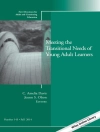This book emphasizes the inherently democratic nature of education; from those who practice in higher education institutions and are involved in decision-making, to those questioning the methods of reform processes in those institutions. As they are faced with increasing pressures to restructure and change their organizations in line with global institutional demands the foundations upon which their leadership and governance are based are called into question. This book takes a critical approach to understanding higher education leadership and governance. The overarching questions asked in this book are: how has higher education come to be assembled in contemporary governance practices within the context of global demands for reform and how are issues of justice being taken up as part of and in resistance to this assemblage?
Inhoudsopgave
Chapter 1. Global Social Justice, Democracy and Leadership of Higher Education: An Introduction; Lynette Shultz and Melody Viczko.- PART I: LEADERSHIP AND THE CHANGING CONTEXT OF EDUCATION.- Chapter 2. Sustainability and Social Justice: Leadership Challenges; Chris Shiel and David Jones.- Chapter 3. Fairness, Equity and Social Cooperation: A Moderate Islamic Social Justice Leadership Model for Higher Education; Eugenie A. Samier.- Chapter 4. 25 Years of University Presence in Europe: Crisis or Renewal; Jousch Andris Barblan.- Chapter 5. Now 35 Years of University Presence in Europe: Fading Hope for Renewal? Response to Barblan; Susan L. Robertson.- Chapter 6. Neoliberal Restructuring, Ethical Internationalization and ‘Beating the Bounds’ of Higher Education; Su-Ming Khoo, Lisa Taylor and Vanessa Andreotti.- PART II: EXPANDING THE ROLE OF HIGHER EDUCATION.- Chapter 7. The Location of the Public Intellectual: Historical and Contemporary Analyses; Ali A. Abdi.- Chapter 8. Cosmopolitanismand Ethics in Higher Education; David Schmaus.- Chapter 9. Public Scholarship and Alternate Economies: Revisiting Democracy and Justice in Higher Education Imaginaries; Su-Ming Khoo.- Chapter 10. Community Engaged Scholarship and the Discourse of Academic Privilege in Canadian Higher Education; Tanja Kajner.- Chapter 11. Student Access: The Struggle to Construct a Post-Apartheid Higher Education System in South Africa; Crain Soudien.- PART III: EDUCATION, DEMOCRACY AND GLOBAL SOCIAL JUSTICE.- Chapter 12. Decolonizing and Delinking North-South Higher Education Partnerships: Imagining Possibilities for Global Social Justice; Allyson Larkin.- Chapter 13. Discipline and Publish: The Tenure Review Process in Ontario Universities; Sandra Acker and Michelle Webber.- Chapter 14. The ‘4R’s Revisited’, Again. Aboriginal Education in Canada: Implications for Leadership in Higher Education; Randy Wimmer.- Chapter 15. A Critical Analysis of the Role of African Universities in Democracy and Social Justice; Girmaw Abebe Akalu and Michael Kariwo.- Chapter 16. Assembling Peerless U: A Canadian Makeover Comes to Grief; Len Findlay and Toni Samek.- Chapter 17. The Contradictions of Corporate Governance in Brazilian Higher Education; Ranilce Guimarães Iosif and Aline Veiga do Santos.- Chapter 18. Establishing World-Class Universities in Russia: Case Study of a Federal University; Tatiana Gounko, Svetlana Panina and Svetlana Zalutskaya.- Chapter 19. Small, Regional and Global: Bath Spa University; Christina Slade.- Chapter 20. From Foxy Loxy to Grit and Moxie: Women Academics Challenging the Orthodoxy of Higher Education; Dawn Wallin and Janice Wallace.- Chapter 21. Socializing Higher Education for Sexual and Gender Minorities: Using Critically Progressive Education to Enhance Recognition and Accommodation; André P. Grace.- Chapter 22. Higher Education and the Internationalization Imagination: Where Personal Biography Meets the Socio-Historical; Marianne A. Larsen and Rashed Al-Haque.- Chapter 23. The ACDE Accords: A Case Study in Democratic Leadership; Kris Magnessum, Blye Frank and Katy Ellsworth.- Conclusion: Where are the Spaces for Leadership and Engagement in Social Justice in Higher Education?; Melody Viczko and Lynette Shultz.
Over de auteur
Lynette Shultz is Associate Dean, International, and Director of the Centre for Global Citizenship Education and Research in the Faculty of Education at the University of Alberta, Canada. Her key research is focused on democracy, social justice, and global citizenship education, and the internationalization of higher education.
Melody Viczko is Assistant Professor of Critical Policy, Equity and Leadership Studies at Western University, Canada. Her research engages a relational approach to educational policy analysis, with a fascination for how actors assemble around policies and how these assemblages influence democratic governance practices in education.












